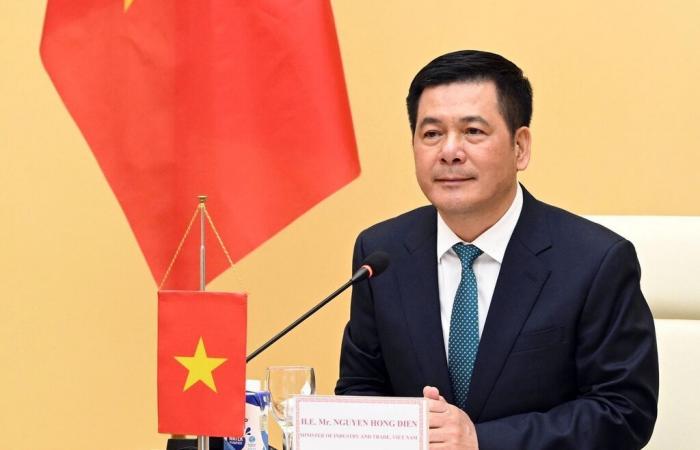>> Ninh Thuân places high expectations on nuclear power project
>> Nuclear energy: a decisive project for the province of Ninh Thuân
>> It is the right time for Vietnam to develop nuclear energy projects
>> Japan ready to support Vietnam’s nuclear energy projects
Minister Nguyen Hong Dien highlighted the local potential for nuclear energy development, noting that fifteen years ago, studies had identified 13 to 14 suitable locations for nuclear power plants.
| Minister of Industry and Trade Nguyen Hong Dien (center) during the conference in Hanoi on January 2. |
| Photo : VNA/CVN |
He said Vietnam’s geography, stretching from north to south, is particularly conducive to small-scale nuclear energy systems. These systems are ideal for areas with low electrical load or abundant renewable energy sources, such as wind and solar. The synergy between small modular nuclear reactors and these renewable sources could provide stable, clean energy, supporting the country’s economic development goals and its commitment to achieving carbon neutrality by 2050.
Nguyen Hong Dien added that Vietnam is a nation with a high proportion of young people that is quickly adapting to advanced technologies.
Ly Quôc Hung, director general of the ministry’s Department of Science and Technology, said the country’s nuclear science and technology workforce currently faces both quantitative and qualitative shortages, including a lack of scientists and high-level engineers.
In addition to specialized energy professionals, more than 50% of the workforce required for nuclear power plant projects will come from other fields, including mechanical engineering, chemistry, materials science, electricity, electronics, automation and environmental sciences. However, domestic education and training institutions currently lack both the experience and focus to prepare human resources for this sector.
According to a report from the Electricity of Vietnam (EVN) group, in 2017 – before the suspension of the Ninh Thuan nuclear power plant project under Resolution No. 31/2016/NQ-QH of the National Assembly, the ministry of Education and Training sent 429 students, including 80 from Ninh Thuan province, to study fields related to nuclear energy at universities in Russia.
EVN also sent 31 students to study nuclear energy-related subjects and sent 24 engineers to Japan for training. Additionally, the group worked with Moscow state-owned company ROSATOM to develop a detailed training plan for the project.
| Le ministre de l’Industrie et du Commerce, Nguyen Hong Dien. |
| Photo : VNA/CVN |
Currently, no comprehensive study or detailed statistics are available regarding the status of these trained personnel. However, it should be noted that only a small number of them are currently employed at EVN, while the majority have taken jobs abroad or work in other industries.
According to the International Atomic Energy Agency (IAEA) and leading global entities like EDF in France and Atomstroyexport in Russia, operating a nuclear power plant with two reactors and a combined capacity of around 2,000 MWe requires a workforce of 600 to 1,200 people, with qualifications ranging from mid-professional to university level in various disciplines. Key operational roles at the plant require individuals with 5-10 years of training and experience.
For Vietnam, operating such a plant would require approximately 1,200 people for safety monitoring and radiation protection, project management, leadership, reactor operation, maintenance, technical support and related services . If the Ninh Thuân 1 and Ninh Thuân 2 nuclear power plant projects are restarted (each with a total capacity of 4,000 MW), the estimated personnel requirements would double.
In addition, this figure excludes the human resources necessary for state management, researchers in institutes and teachers in university institutions.
Minister Nguyên Hong Dien stressed that the development of human resources is a decisive factor for Vietnam to implement its ambitious nuclear energy plan. Sustainable development in this area requires the establishment of a complete ecosystem for nuclear energy. To this end, it is necessary to complete a forecast of training demand, scale and specialist areas by the end of the first quarter of 2025.
VNA/CVN






